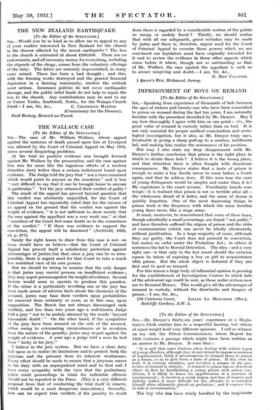THE WALLACE CASE
[To the Editor of the SPECTATOR.] SIR,—The case of Mr. William Wallace, whose appeal against the sentence of death passed upon him at Liverpool was allowed by the Court of Criminal Appeal on May 18th, raises several disquieting problems.
At his trial no positive evidence was brought forward against Mr. Wallace by the prosecution, and the case against him was far more like the ingenious efforts of a modem detective story writer than a serious indictment based upon evidence. The Judge told the jury that " not a trace remained which would point to anyone as the murderer," and it 'was " very difficult to say that it can be brought home to anyone in particular." Yet the jury returned their verdict of guilty
The result of the appeal has proved beyond question that this verdict was absolutely unjustified, for the Court of Criminal Appeal has repeatedly ruled that for the success of an appeal on the ground that the verdict was against the weight of evidence, " it is not sufficient to show merely that the case against the appellant was a very weak one," or that " members of the Court feel some doubt as to the correctness of the verdict." " If there was evidence to support- the conviction, the appeal will be dismissed " (Archbold, 1922, ed. p. 377).
Surely the right lesson to draw from this case is not—as some would have us believe—that the Court of Criminal Appeal has proved itself a satisfactory protection against miscarriages of justice, but that, since a jury can be so irres- ponsible, there is urgent need for that Court to take a much less restricted view of its own powers.
But we should be wrong to assume that the only danger is that juries may convict persons on insufficient evidence ; they may acquit persons against the weight of evidence. Several factors would seem to operate to produce this paradox. If the crime is a particularly revolting one or the jury has been made aware of adverse facts about the character of the accused, juries may base their verdicts upon probabilities far removed from certainty or even; as in this case, upon supposition. The Bench has not always discouraged such verdicts, and less than two years ago a well-known Judge told a jury " not to be unduly alarmed by the words ' beyond reasonable doubt.' " On the other hand, if the sympathies of the jury have been aroused on the side of the accused, either owing to extenuating circumstances or in revulsion from the nature of the penalty, juries may acquit against the weight of evidence. A year ago a judge told a man he had been " lucky in his jury."
I believe in the jury system. But we have a clear duty laid upon us to realize its limitations and to protect both the juryman and the prisoner from its inherent weaknesses. Every effort should be made to ensure that a juryman comes to his duty with an unprejudiced mind and to that end I have every sympathy with the view that the preliminary police court proceedings in trials for indictable offences should not be reported in the Press. (This is a very different proposal from that of conducting the trial itself in camera, which would be a most dangerous innovation.) Secondly, how can we expect true verdicts if the penalty to result E. ROY CALVERT. from them is regarded by a considerable section of the public as wrong or unduly harsh ? Thirdly, we should realize that with all our safeguards, grave mistakes may be made by juries and there is, therefore, urgent need for the Court of Criminal Appeal to exercise those powers which we are convinced our legislators must have originally intended for it and to review the evidence in those other appeals which come before it where, though not so outstanding as that of Mr. Wallace, the case against the appellant is such as to arouse misgiving and doubt.—I am, Sir, &e., 1 Queen's Rise, Richmond, Surrey.






































 Previous page
Previous page